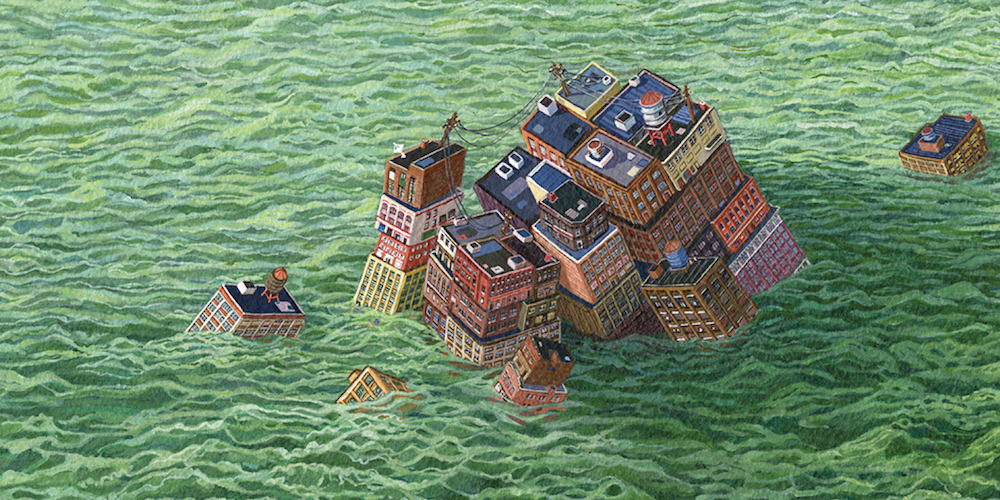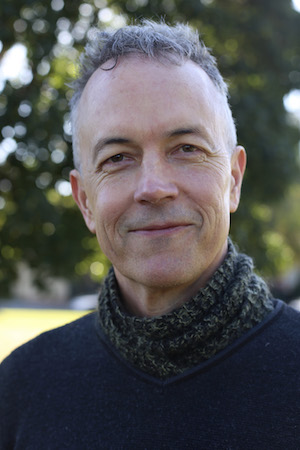Flash Essays by David Carlin and Nicole Walker
Excerpts from The After-Normal
Editor’s Note: The personal impact of climate change is not an easy thing to convey, but an increasing number of literary writers are taking up the challenge. In The After-Normal: Brief, Alphabetical Essays on a Changing Planet, David Carlin and Nicole Walker create a lively exchange of ideas and witty riffs—a refreshing change of pace.
This 2019 book from Rose Metal Press gathers a series of short essays in alphabetical order—everything from “Albatross” to “Igloo” to “Vulture” to “Z.” David Carlin is an Australian writer who lives in Melbourne and teaches at RMIT University. American essayist Nicole Walker teaches at Northern Arizona University in Flagstaff. In their preface to The After-Normal, they say this project began when David asked Nicole to come to Melbourne to give a speech at RMIT.
During Nicole’s stay, she joined David and his wife at their home on the nearby Surf Coast, where they walked and talked on the beach about “the trouble with environmental writing—how some of it can be so depressing, humorless, shaming, guilt-ridden…. What we needed, we half-joked, was a survival guide.” They went on to “co-opt” the A-to-Z format of how-to books:
Since we believe, all irony aside, that cooperative creative action is exactly what is needed in this emergency, we wanted to see if we could do this on a micro-scale by writing this book together as a kind of long-distance, improvised duet, from opposite sides of the world.
We’re pleased to reprint two of their essays from The After-Normal—“Decomposition” and “Dear David,”—as part of the TW Reading Series. For more information, see the Rose Metal Press page for The After-Normal: Brief, Alphabetical Essays on a Changing Planet.
Decomposition
Essay by David Carlin
The world is on fire, and some people want to live forever. Maybe everybody, on a given day, wants to live forever. Although that’s clearly not true: I can think of too many who, on a given day, came to a different conclusion.
Our backyard in Melbourne is a veritable rabbit cemetery. Our children, Esther and Louis, were spared the full horror of the crime scene that time the dogs got in, but Esther was a big one for making crosses out of old bits of wood we found in the shed—nailing them together in the simplest of hardware acts, applying some varnish and some decorations. RIP, she would write. I suppose we taught her that crosses and RIP were how you responded when something that you cared about had died. Even if you didn’t believe in Jesus or God.
Once we had shoveled the dirt on top of the shoeboxed rabbits and planted the lacquer-dry wooden emblem at the head, like pretend grave-diggers, we put the tools back in the shed and went on with the next thing and never once gave those rabbits another thought. At least I didn’t. Certainly not to their decomposing bodies in their decomposing cardboard coffins. It is not considered normal or healthy to watch flesh decompose. It is viewed as morbid. Even serial killers, so far as I’m aware, would prefer to chop up their victims’ bodies and put them in the freezer or bury them under the house, rather than sit at the kitchen table, breathing in the stench, as maggots metamorphose into blowflies and liquids pool in Rothko hues. Or whatever.
Decomposition could also mean to unwrite a book. To sing an opera back to silence. To edit is to compose by decomposing. Every composite requires an opposite. Two taps forward, one finger on delete. Besides, it all depends which way you look at it and who you are. My decomposing body might be inspiration for whole tribes of thankful creatures in the soil. Even ink and paper might be better off digested. Not so much my laptop—that will take a million years to decompose, give or take.
They say that peat is helping to slow runaway global warming.1 The organic remains of plants and animals release carbon dioxide into the atmosphere when they decompose, thanks to the industry of fungi, microbes, flies, beetles, crows, vultures, foxes, and so on. But in a peatland, normal rules of decay do not apply. Regular processes of decomposition are suspended in a watery goo. The creatures that would attack your everyday serial-killed body or your beloved rabbit and munch it into oblivion can’t breathe underwater in such places: there’s not enough oxygen. Decomposition slows and slooooooooowwws. Think of a long, lugubrious, rippling note played by a Lewis Carroll walrus on a bassoon.
A peatland can be called a quag, a bog, a mire, a fen, a morass, a slough, a sump. Typically, these waterlogged domains have been cast as gloomy, uncanny places where nothing grows and bodies float to the surface, or don’t. For centuries, they’ve been drained to make land useful for agriculture and dwelling. It might have been better to leave well alone. Peatlands trap vast amounts of carbon that plants have captured from the air through photosynthesis across millennia.
To say that we are mired, then, in planet-sized problems, is misleading. What we need above all else is mires. The impulse to drain the swamp is exactly what got us into this mess in the first place.
Slooooooooow, sounds the walrus, as if unmaking opera.
Slooooooooooooooooooooooooooooooooowwwwwww.
I make a mental note to from now on better appreciate peatlands and their subtle arts of un-decomposition. All things are in motion, cycling through beginnings after endings, but it is beautiful if they get bogged down here and there.
1. Peatlands and Climate Change, edited by Maria Stack (International Peatland Society, 2008).

Dear David,
Essay by Nicole Walker
Since last we spoke, things have changed. When we sat in bright light at your long dining-room table in Melbourne and typed what we’d spoken about how we would write about learning to sit with the trouble, I still had some hope that when I left Melbourne and returned to Arizona, the situation would have been fixed. That some other candidate, probably one named Hillary, would have stepped out on stage and said, Ha ha, very funny. But no. So far, no jokes except these: one of my undergrads was called the N-word, and on my sister’s high school Biology classroom chalkboard, a student drew an oven and wrote the words, “Drawer for Jews.” Nope, the world that became unbelievable was still unbelievable upon my return. Cabinet members nominated with a zero rating for women’s rights advocacy, with racist backgrounds, with climate change denying records were being confirmed as if this were a normal presidency. A lawyer who fought against environmental protections is now the Secretary of the Environmental Protection Agency. “Protection” seemed, once upon a time, like such a well-defined and clear word.
I misquoted to you the literary critic and philosopher Slavoj Žižek, famous for his snark and for his unwillingness to adhere to a particular ideology. I said to you that he wrote, “Progressivism mustn’t make quaint the environment. To move forward is to change. Trying to preserve is to museumize. Conservation becomes as paternalistic to nature as it is to women and to civil rights, saying ‘We know what’s right for you.’” I looked for this pretend Žižek quotation. I couldn’t find it. But I did find him saying this:
The fear is that this bad ecology will become a new opiate of the people. And I’m against the ecologists’ anti-technology stance, the one that says, 'We are alienated by manipulating nature, we should rediscover ourselves as natural beings.' I think we should alienate ourselves more from nature so we become aware of the utter contingency, the fragility of our natural being.
We should alienate ourselves more from nature to be aware of our fragility.1
If one calls preserving nature “paternalistic,” then I wonder what one should call the destruction of nature? What one should call the use of nature for capitalistic gain? Either way, we are making a direct object out of nature. We must save nature. We must use nature. We must constrain nature. We, humans, must contemplate nature. We must go into nature for our own mental health. Do we agree with Žižek? Is this similar to what we were saying as we sat at the long table together, that making precious the environment makes an “other” of it? Žižek sees this move as a way of gaining perspective, of distancing ourselves from nature so we can see ourselves as part of it. “Manipulating nature,” or thinking we have control over it and can preserve it, is not only paternalistic, but also fails to acknowledge that we are as precarious as the nature we pretend to protect. Do we have to be alienated from nature to become part of fragile nature?
My inclination is different than Žižek’s. I think instead of separating from nature so we can see the nature in ourselves, we could stop drawing boundaries between nature and city or nature and human or nature and manufacture, and begin to see the wildness as those parts of our world that braid across and against each other. Not so much less concrete and more parks, but more prepositions—we live in the world, whether that world is a city, a suburb, or a tent in the Jefferson Wilderness. We live under the sky. We live next to houses, humans, and herons. We live on top of humus even if we pour layers of concrete on it. What if we paid as much attention to the paint flaking off the bike rack in front of Chipotle as we do to the unfurling of a Monarch butterfly’s wings? Is a neon sign offering five-dollar parking as beautiful as an ant carrying a fleck of leaf up an anthill? Maybe not, but perhaps the attention paid is in itself the payoff.
1. “Žižek Slavoj: Ecology is the New Opiate of the Masses” by dustysojourner, January 15, 2013.
 David Carlin is a writer and creative artist based in Melbourne, Australia. He is the author of The Abyssinian Contortionist (2015) and Our Father Who Wasn’t There (2010); co-author of 100 Atmospheres: Studies in Scale and Wonder (2019); and the editor, with Francesca Rendle-Short, of an anthology of new Asian and Australian writing, The Near and the Far (2016). His award-winning work includes essays, plays, radio features, exhibitions, documentary, and short films; recent projects include the Circus Oz Living Archive and WrICE. He is a professor of creative writing at RMIT University, where he co-directs the non/fictionLab. Visit his website here.
David Carlin is a writer and creative artist based in Melbourne, Australia. He is the author of The Abyssinian Contortionist (2015) and Our Father Who Wasn’t There (2010); co-author of 100 Atmospheres: Studies in Scale and Wonder (2019); and the editor, with Francesca Rendle-Short, of an anthology of new Asian and Australian writing, The Near and the Far (2016). His award-winning work includes essays, plays, radio features, exhibitions, documentary, and short films; recent projects include the Circus Oz Living Archive and WrICE. He is a professor of creative writing at RMIT University, where he co-directs the non/fictionLab. Visit his website here.
• • •
 Nicole Walker is the author of Sustainability: A Love Story (2018), Where the Tiny Things Are (2017), Egg (2017), Micrograms (2016), Quench Your Thirst with Salt (2013), and This Noisy Egg (2010). She edited the essay collections Science of Story with Sean Prentiss and Bending Genre: Essays on Creative Nonfiction with Margot Singer. She is the recipient of a National Endowment for the Arts award and is a noted author in Best American Essays. She is a professor of English at Northern Arizona University, where she teaches creative writing. Visit her website here.
Nicole Walker is the author of Sustainability: A Love Story (2018), Where the Tiny Things Are (2017), Egg (2017), Micrograms (2016), Quench Your Thirst with Salt (2013), and This Noisy Egg (2010). She edited the essay collections Science of Story with Sean Prentiss and Bending Genre: Essays on Creative Nonfiction with Margot Singer. She is the recipient of a National Endowment for the Arts award and is a noted author in Best American Essays. She is a professor of English at Northern Arizona University, where she teaches creative writing. Visit her website here.
